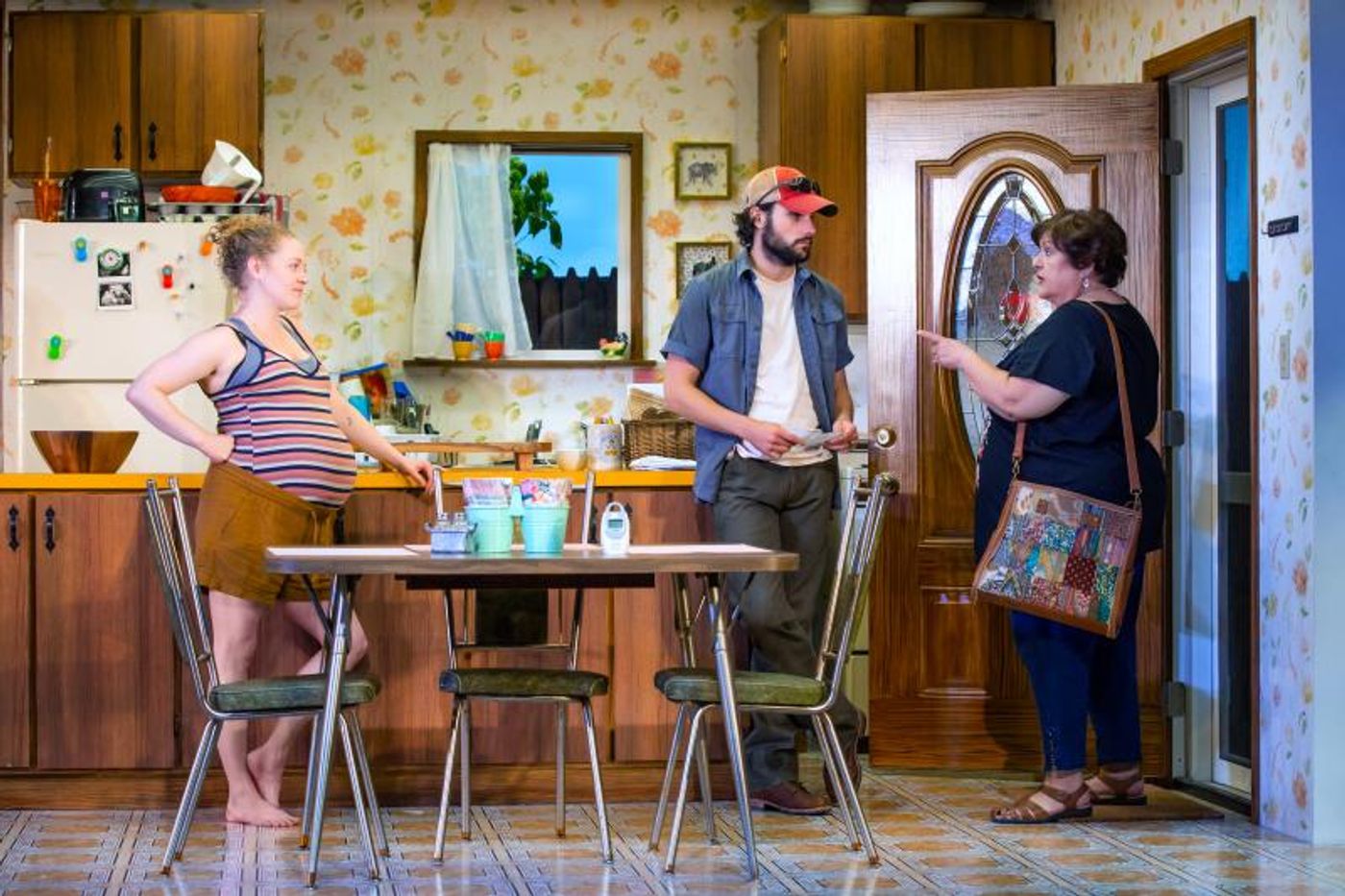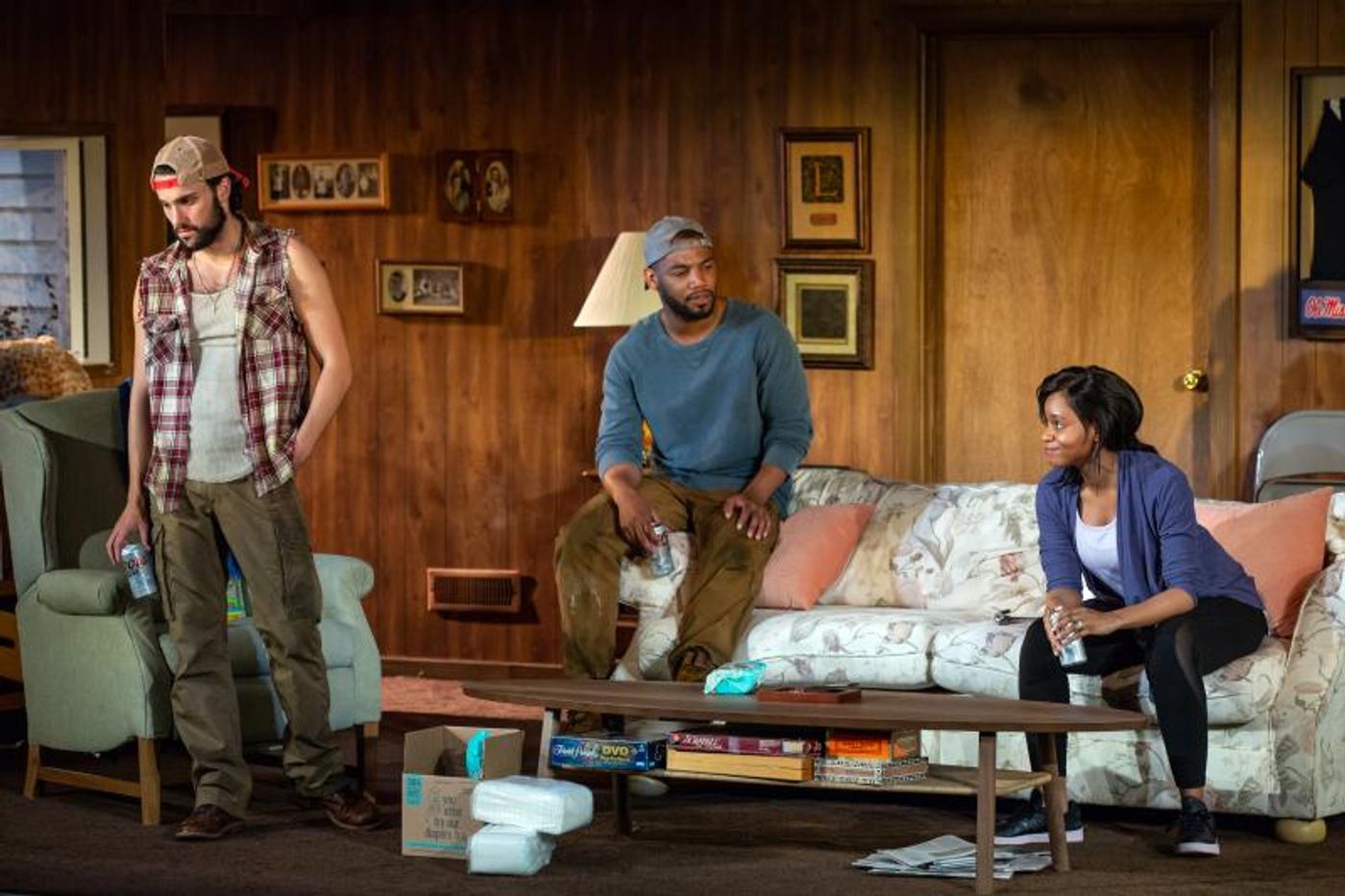Review: BYHALIA, MISSISSIPPI at The Kennedy Center

At its surface, Byhalia, Mississippi does not seem like the kind of play that would connect with many, especially in a city like DC. The plot feels very specific to a place and viewership: Laurel and Jim are expecting their first child, and are struggling with not only the wait to be parents, but also with Laurel's overbearing, deeply critical mother, Celeste, who dislikes Jim and his rural hometown. Although Laurel forces Celeste to leave until the baby finally arrives, it's Celeste she must rely on when the child is born and it's abundantly clear that the child isn't Jim's. Meanwhile, Jim takes out his rage on his best friend, Karl, by falsely accusing him of fathering the child; the two quickly reconcile, and Jim moves in with Karl until he can decide what to do. When the father of the baby is revealed to be Laurel's married boss, whose wife, Ayesha, also recently gave birth, additional layers are added to the mess: he's a prominent member of the town's social system, and his wife has worked to ensure she has the perfect life, so she's unwilling to allow anything to threaten that.
And yet, this show absolutely resonates, because its characters are what makes Byhalia, Mississippi come alive. From the opening interaction between Laurel and Celeste, every conversation - every interaction - rings with a veracity that draws the audience in. Even when the characters are at their worst, they show a vulnerability that keeps you from writing them off. Playwright Evan Linder achieves a fascinating balance - their relationships feel raw and real, and often funny and horrifying. While it's hard to fully root for any character, it's equally difficult to dismiss them completely.

That balance allows the show to explore deep, often difficult themes head-on. Byhalia, Mississippi not only looks into love and betrayal through Laurel and Jim's marriage, but also examines those themes in the context of friendship, family, forgiveness, and sense of self. It tackles race and class in a direct, unblinking manner that forces the audience to consider their own prejudices. Jim and Laurel joke about being "white trash," but also have to consider the realities of raising a child in a rural area where the few work opportunities are less than ideal. Jim and Karl are forced to face the imbalance in their relationship and how it's exacerbated by Jim's ability to simply ignore difficulties that are part of Karl's daily life. Ayesha confronts Laurel about the world her son will inevitably face, and Laurel, in turn, calls out Celeste's vile prejudices. Above all, it circles back to questions about identity, love, and forgiveness - what do we owe each other, our communities, and ourselves?
Because so much of this show relies on is characters, it requires a solid cast, and, fortunately, the Kennedy Center's production more than delivers. Caroline Neff's Laurel is the perfect blend of selfish and caring, and her handling of the fallout of Jim's and her own infidelities is beautifully emotional. Jack Falahee's Jim is lovable and frustrating, and it's hard not to empathize with his bewilderment and anger at Laurel's betrayal, even as his willful ignorance about the impact racial disparity has on his friendship with Karl becomes abundantly clear. Blake Morris' Karl is delightful and anchors the show well, which makes his emotional revelations resonate so deeply. Aimé Donna Kelly commands the stage from the moment she makes her entrance as Ayesha, and plays the character with a regality that befits the character's social status and serves as a wonderful contrast to the absurdity of her more dramatic, desperate actions. Rounding out the cast is Cecelia Wingate, who originated the role of Celeste when the show first premiered in 2010; Wingate's portrayal of the brash, borderline abusive, racist, fiercely loving and loyal Celeste perfectly captures the complexities of the character. Her heartfelt exchange with Laurel is a wonderful emotional roller coaster, taking the audience just nearly to her side before dashing their sympathies with her prejudices. The chemistry between the cast members is also strikingly good - the tensions between Laurel and Jim as well as Laurel and Ayesha during their confrontations are palpable, and the charged interaction between Jim, Karl, and Ayesha that is broken with laughter was carried so perfectly that the actors seemed to break slightly into their own laughter and enjoyment.

Surrounding the cast is Cameron Anderson's wonderful set; by looking at Jim and Laurel's two-bedroom home, the audience immediately gets a sense of their lives, and the carefully placed props perfectly portray the chaos of early parenthood. The split scene with the rooftop adds an additional layer for the audience, giving both further insight to the lives of the characters while maximizing on the single set. Jen Caprio's costumes are perfectly fitting to the characters, and help the audience understand them on a deeper level. Director Kimberly Senior, with the help of Production Stage Manager Megan Stewart Dickert and Assistant Stage Manager Hillary Pfeffer, moves the cast almost effortlessly around the stage and conflicts; the flow of the show feels so natural, it's almost easy to forget they're being directed. In fact, the only sour note in the performance came from the sound design; while the microphones were fine, the sound effects utilized for background action were distractingly ill-placed. Some cues seemed to come from a direction inconsistent with the source (such as the baby's crying), and others came far too early (at one point, a car is heard starting the instant a character steps into the wings). These may be minor issues, but, next to the tighter elements of the show, stood out starkly.
Overall, Byhalia, Mississippi is a poignant work that speaks to audiences and examines our humanity. And that will resonate with audiences in Washington, DC, Byhalia, Mississippi, and everywhere else.
Byhalia, Mississippi plays at the Kennedy Center's Terrace Theater through July 7. The run time is approximately two hours with one 15-minute intermission. Tickets are available on the Kennedy Center website.
Photos courtesy of Jeremy Daniel.
Reader Reviews
Videos

